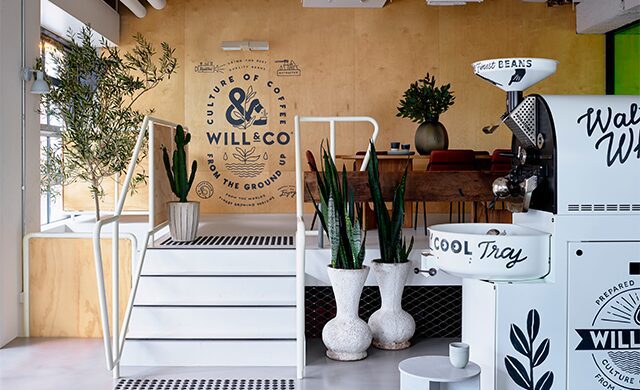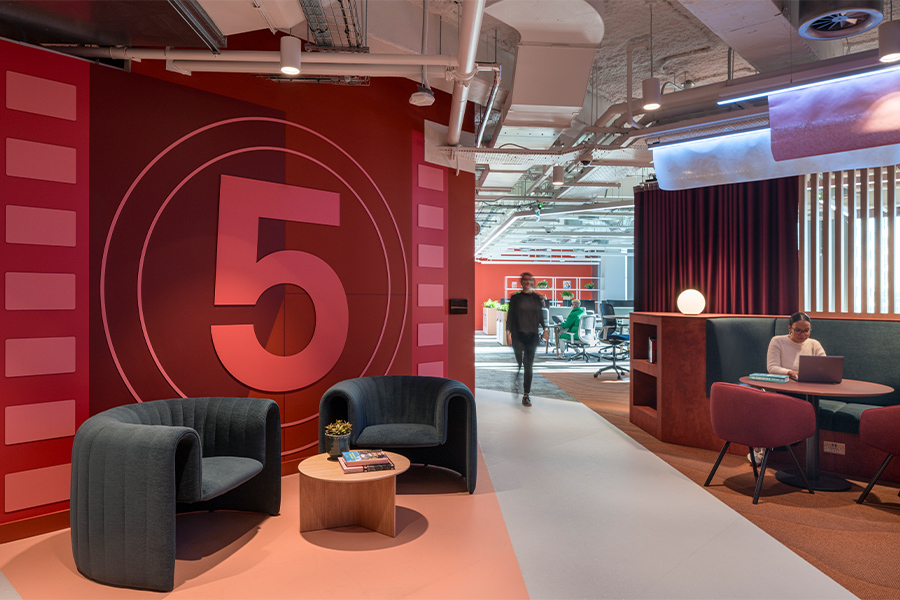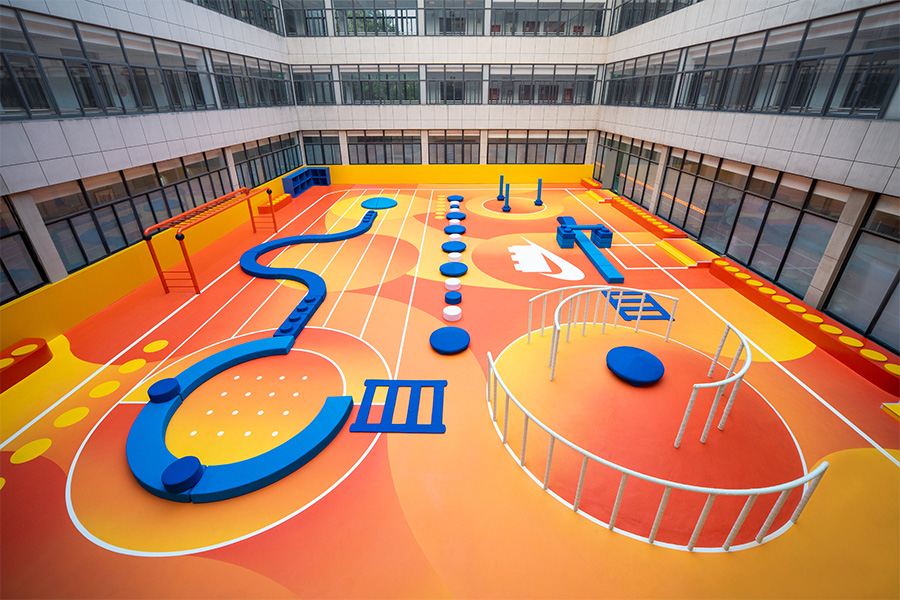Three concepts—an experimental café hybrid in Australia, a gym that resembles a hotel lobby, and a new outdoor-focused lifestyle brand—epitomize hospitality’s ongoing evolution.
Will & Co.

Stairs lead to the mezzanine office space at the bright and eclectic Will & Co.
Bondi-based specialty coffee brand Will & Co. has been keeping Australia caffeinated since it was launched by a group of friends in 2013. This year, “we decided to take the brand to the next level for our clients and consumers,” says cofounder Josh Passaro. “We wanted to control every aspect of the coffee experience, from the beans to the environment [where] the coffee is enjoyed to the crockery it’s drunk out of.”
Enter their brick-and-mortar concept store on Bondi Beach. Beyond the coffee itself, the boutique roastery includes a showroom, training venue, café, and plays host to workshops and events for the local community. The experimental hybrid space is a chance for the brand to engage with the public in a nontraditional way by “connecting us directly with the end consumer,” Passaro adds.

A coffee bar done in blue resin reflects its coastal setting
The design by Jeremy Bull, founder of local firm Alexander & Co., is playful yet sophisticated, reflecting the brand’s coastal lifestyle. A restrained color palette complements the layered approach, with exposed and painted recycled brick, blue-rendered walls and tiles, polished concrete, and leather accents. Beyond the monolithic centerpiece resin coffee bar, “a dichroic film as artwork/privacy screen adds drama, while a façade wrapped in retractable glass encourages maximum street activation,” says Bull.
It’s only the beginning for Will & Co. according to Passaro. “I’d love to see a similar concept roll out in key cities such as Los Angeles and Tokyo. It’s early days, but who knows what the future will bring.”
Midtown Athletic Club

A grand staircase will welcome guests to the Bannockburn location, shown in a rendering
Following the successful renovation of the Midtown Athletic Club in Chicago in 2018, the brand has several new locations in the works, including in Rochester, New York and the Illinois suburb of Bannockburn. The expansion is thanks in part to the health and wellness club seeing itself as much more than a gym. As CEO Steven Schwartz sees it, Midtown Athletic Clubs are “your true third space,” he says, “a local sports resort where you go regularly to see friends and family to exercise, play sports, and relax.”
Schwartz once again tapped Evanston, Illinois-based DMAC Architecture to create the two new properties. Although brand signatures like porcelain tile floors and dramatic sculptural interventions anchor each outpost, distinctive design elements distinguish them and encourage an active lifestyle. “Our club environments are energizing,” Schwartz adds. “You have to be there to feel the positive energy created by the combination of people and design.”

A rendering of the glulam-wrapped 8,000-square-foot saltwater pool in Rochester
In Rochester, for instance, the interiors embrace the building’s original 1970s aesthetic while also orienting the structure around communal hubs like a sundrenched café and living room. The standout is the 8,000-square-foot indoor saltwater pool. Cast in whitewashed glulam and detailed with exposed natural wood and a green wall, the space provides an inviting respite from the city’s often unpredictable weather. The Bannockburn location also celebrates community with a spacious new arrival experience that leads to a skylit atrium lobby punctuated by a grand staircase and a suspended white fabric art installation. “We want guests to have a hospitality experience from the moment they arrive,” says DMAC founder Dwayne MacEwen.
LOGE Camps

The former Wayside Inn has been reimagined as the LOGE Breckenridge in Colorado
In the short time it’s been around, LOGE Camps (named for its motto to “Live Outside Go Explore”) has become both an escape for guests who want to experience the great outdoors and a safe way to socially distance while the U.S. continues to deal with COVID-19.
Cofounded by Johannes Ariens and Cale Genenbacher in 2016, the concept marries the best parts of homesharing services like Airbnb with something scalable in the active outdoor lifestyle space. After raising $30,000 on Kickstarter, the duo opened the inaugural property in 2017 in Westport, Washington, a cold-water surf destination about three hours from Seattle. “People bought the idea of what we were doing and trusted that we were going to figure it out,” Ariens says.

Outdoor hangout areas set the stage at the LOGE Bend in Oregon
The brand’s hallmark is transforming rundown motels into lifestyle-driven properties with a retro ’70s roadtrip motif, all spearheaded by Paula Anast of Portland, Oregon firm Round 2 Design. Accessibility and affordability are also top of mind for Ariens and Genebacher, who seek out drive-to destinations that are deeply immersed in nature. Outposts in Leavenworth, Washington; Bend, Oregon; Breckenridge, Colorado; and Mount Shasta, California offer traditional hotel rooms and hostel-like accommodations, while some also include RV hookups and campsites for those more inclined to adventure.
Airnes credits the rapid success of LOGE to the lifestyle company’s “host like a friend” philosophy, which takes out the middleman for a technology-first approach. Check-in, for example, is all digital, with guests receiving a text message with their room number. However, a big differentiator is LOGE’s partnerships with local artists and musicians who bring the locations to life. The goal, Airnes says, is “being an uplifting part of the communities we’re in.”
Photography and renderings courtesy of Alexander & Co., DMAC ARCHITECTURE, Liam Doran, and LOGE
This article originally appeared in HD’s August 2020 issue.



